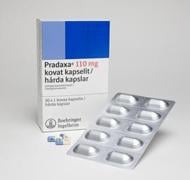
December 15, 2010 – A guest editorial in the new publication Clinical Investigation highlights dabigatran etexilate as an alternative to warfarin for long-term stroke prevention in patients with non-valvular atrial fibrillation.
In the article, Jeffrey Weitz, M.D., and John Eikelboom, both from McMaster University in Hamilton, Canada, discuss the importance of the U.S. Food and Drug Administration’s (FDA) approval of dabigatran etexilate (Pradaxa) in October. Pradaxa is made by Boehringer Ingelheim.
Non-valvular atrial fibrillation is a heart rhythm abnormality that is an important risk factor for stroke. Prophylactic anticoagulation with warfarin is commonly used, but it is a notoriously difficult drug to administer. The appropriate dose varies from patient to patient, and is based on the patient’s genetic profile, differences in the dietary intake of vitamin K and multiple drug interactions. Response to warfarin is so variable that frequent monitoring is necessary to ensure that the level of anticoagulation is therapeutic.
Such monitoring is burdensome for patients and physicians alike, and costly for the healthcare system. Even when monitoring is performed, the level of anticoagulation is above or below the therapeutic range in at least half the patients, with consequent risk of bleeding or thrombosis. As a result, warfarin tends to be underused for stroke prevention in patients with atrial fibrillation.
Dabigatran etexilate is an oral anticoagulant that can be given in a fixed dose and results in such a predictable level of anticoagulation that monitoring is unnecessary.
The advantages over warfarin include a rapid onset of action, predictable anticoagulant effect and low potential for interactions with food or other drugs. It does require twice daily administration, and methods to monitor its anticoagulation effect are not yet well developed. The drug is also not suitable for those with severe renal impairment, and because there is no antidote, there is an increased risk of bleeding in patients requiring urgent procedures. Nevertheless, the authors summarize, “The approval of dabigatran etexilate as an alternative to warfarin for stroke prevention in atrial fibrillation ushers in a new era for long-term anticoagulation.”
Several other new oral anticoagulants are also in advanced stages of development. These agents, including rivaroxaban, apixaban and edoxaban, are oral factor Xa inhibitors and share many of the advantages of dabigatran etexilate over warfarin, and may have advantages over dabigatran itself.
For more information: www.future-science.com


 January 28, 2026
January 28, 2026 









